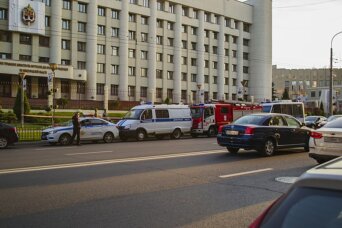- About
- Topics
- Picks
- Audio
- Story
- In-Depth
- Opinion
- News
- Donate
- Signup for our newsletterOur Editors' Best Picks.Send
Read, Debate: Engage.
| topic: | Freedom of Expression |
|---|---|
| located: | Russia |
| editor: | Igor Serebryany |
Editor-in-chief of an independent newspaper Koza in the city of Nizhni Novgorod in central Russia, Irina Slavina, died on the 2nd of October after setting herself on fire in front of the regional police building.
In her Facebook, she left a note just hours before the Sharia-style act of desperation: "I accuse the Russian Federation of my death". [https://www.facebook.com/slavirina] Her last antemortem post collected over 12,000 responses as of Tuesday.
In her suicide note Slavina, 47, said she was driven to her act by the authorities' "acts of lawlessness": the day before, police searched her apartment and confiscated computers and other hardware, including those of her relatives. Police said it was looking for the evidence that Slavina worked for the Open Russia. Russian authorities blacklisted the organization funded by the exiled personal foe of president Vladimir Putin, Mikhail Khodorkovsky, as a "foreign agent".
Last week, she was summoned to the Nizhni Novgorod's prosecutor's office as a witness in a criminal case opened against members of the Open Russia. On the 1st of October, police searched the homes of five more suspects, all of them allegedly linked to the Open Russia.
Slavina insisted she had nothing to do with the Open Russia and police pressure on her had been caused by her newspaper's independent coverage of the local affairs. She founded the Koza in 2015.
She said that founding a donation-funded news outlet was the only way to bypass "all-out censorship" in the region.
"Irina's Koza was a rare example of a news outlet that managed to survive on crowdfunding. She earned respect among the audience for her independent investigations, and Koza was frequently quoted by the official news outlets. Still, at the same time, she was a target of numerous attacks, both from official authorities and the mobs directed by her publication's 'anti-heroes'. She was an eyewinker of theirs", Irina's colleague Anastasia Sechina says.
In contrast with her softhearted nature, Slavina adhered to the uncompromising political platform, always calling spade a spade, which very many disliked, the Open Russia's press officer Natalia Gryaznevich recalls.
"She was just a free and passionate person, a deadly dangerous combination in modern Russia", she says.
Russian public believes now that the prosecutor's subpoena and police search were just the last straw for Slavina, as she was repeatedly fined for her publications and her private car was damaged several times. Still, most of her colleagues, friends and observers consider suicide as an exaggerated act which adds too little to the freedom of expression cause.
On Sunday, Russian Human Rights Council called the Prosecutor's General Office to investigate the tragedy on the "incitement to suicide" and "abuse of power" criminal charges. The HRC stresses the violation of the freedom of speech has been a "commonplace" in this country. It says that Slavina's suicide was "an extreme still, in a way, logical sort of protest" against police's lawlessness.
Leader of the anti-Putin opposition Alexei Navalny, who was poisoned with a nerve agent in August, reportedly on Kremlin's order, agreed that Slavina's suicide was "a result of the never-ending police harassment and it must be qualified as an incitement to suicide". [https://twitter.com/navalny/status/1312049304060735492] He called to bring to justice not only the regional police officials but also their "masters in Kremlin".
Image by Алексей Трефилов
